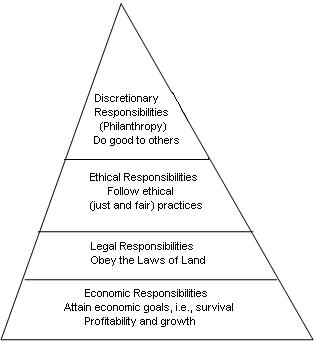Carrols Model of Corporate Social Responsibility
Carrols Model of Corporate Social Responsibility Assignment Help | Carrols Model of Corporate Social Responsibility Homework Help
Carrol’s Model of Corporate Social Responsibility
Corporate Social Responsibility (CSR) is an umbrella term that includes economic, legal, ethical and discretionary (Philanthropic) responsibilities of any business enterprise. Corrol’s model consider four components of corporate social responsibility, namely, (1) Economic responsibilities, (2) Legal Responsibilities, (3) Ethical responsibilities, and (4) Discretionary responsibilities (also called philanthropy). These components are not mutually exclusive. In practice, they intermingle with each other. However, this model can serve as a guide for the management of any organization in discharging their social responsibilities.

The pyramid portrays the four components of social responsibilities with economic responsibilities at the bottom because a business earns adequate profits to survive and grow ant o be able to undertake philanthropic or dictionary activities shown at the top of the pyramid. The business us be run legally, i.e., it must obey the laws of the land. Further, business must be run ethically, i.e., it must follow business practices which are just and fair. Now we shall have a brief description of the social obligations of a company.
Economic Responsibilities. A business is an economic entity so it must fulfill its economic responsibilities which are as follows:
(i) TO advance the economic interests of investors or shareholders, i.e., earning a fair rate of return on investment.
(ii) TO use the economic resources efficiently.
(iii) To develop the business on sound commercial principles.
(iv) To generate internal funds for investment in business.
Legal Obligations/Responsibilities. There obligations have been created by various laws of the country. They include the following:
(i) To follow faithfully the economic, labour and other laws fo the nations.
(ii) To pay taxes and other government dues in time.
(iii) TO cooperate with the government in achieving socio-economic objectives.
(iv) To provide necessary information required by the government.
Ethical Responsibilities. These are concerned with following the social norms of the society. The society requires the business:
(i) To follow fair trade practices such as reasonable prices, good quality products and adequate publicity.
(ii) TO safeguard the interests fo labour, consumers and the community at large.
(iii) To follow sound business principles for the advancement of its own interests and those of the society.
(iv) To take anti-pollution steps.
Discretionary Responsibilities/Philanthropy. These obligations are in addition to those motioned above . The business houses have the discretion to assume the following responsibilities:
(i) To contribute to the welfare of the local community.
(ii) To help weaker sections of the society.
(iii) To contribute to the education of workers and general public.
(iv) To generate employment opportunities for the local population.
For more help in Carrol’s Model of Corporate Social Responsibility click the button below to submit your homework assignment
Pyramid of Corporate Social Responsibility
The pyramid portrays the four components of social responsibilities with economic responsibilities at the bottom because a business earns adequate profits to survive and grow ant o be able to undertake philanthropic or dictionary activities shown at the top of the pyramid. The business us be run legally, i.e., it must obey the laws of the land. Further, business must be run ethically, i.e., it must follow business practices which are just and fair. Now we shall have a brief description of the social obligations of a company.
Economic Responsibilities. A business is an economic entity so it must fulfill its economic responsibilities which are as follows:
(i) TO advance the economic interests of investors or shareholders, i.e., earning a fair rate of return on investment.
(ii) TO use the economic resources efficiently.
(iii) To develop the business on sound commercial principles.
(iv) To generate internal funds for investment in business.
Legal Obligations/Responsibilities. There obligations have been created by various laws of the country. They include the following:
(i) To follow faithfully the economic, labour and other laws fo the nations.
(ii) To pay taxes and other government dues in time.
(iii) TO cooperate with the government in achieving socio-economic objectives.
(iv) To provide necessary information required by the government.
Ethical Responsibilities. These are concerned with following the social norms of the society. The society requires the business:
(i) To follow fair trade practices such as reasonable prices, good quality products and adequate publicity.
(ii) TO safeguard the interests fo labour, consumers and the community at large.
(iii) To follow sound business principles for the advancement of its own interests and those of the society.
(iv) To take anti-pollution steps.
Discretionary Responsibilities/Philanthropy. These obligations are in addition to those motioned above . The business houses have the discretion to assume the following responsibilities:
(i) To contribute to the welfare of the local community.
(ii) To help weaker sections of the society.
(iii) To contribute to the education of workers and general public.
(iv) To generate employment opportunities for the local population.
For more help in Carrol’s Model of Corporate Social Responsibility click the button below to submit your homework assignment